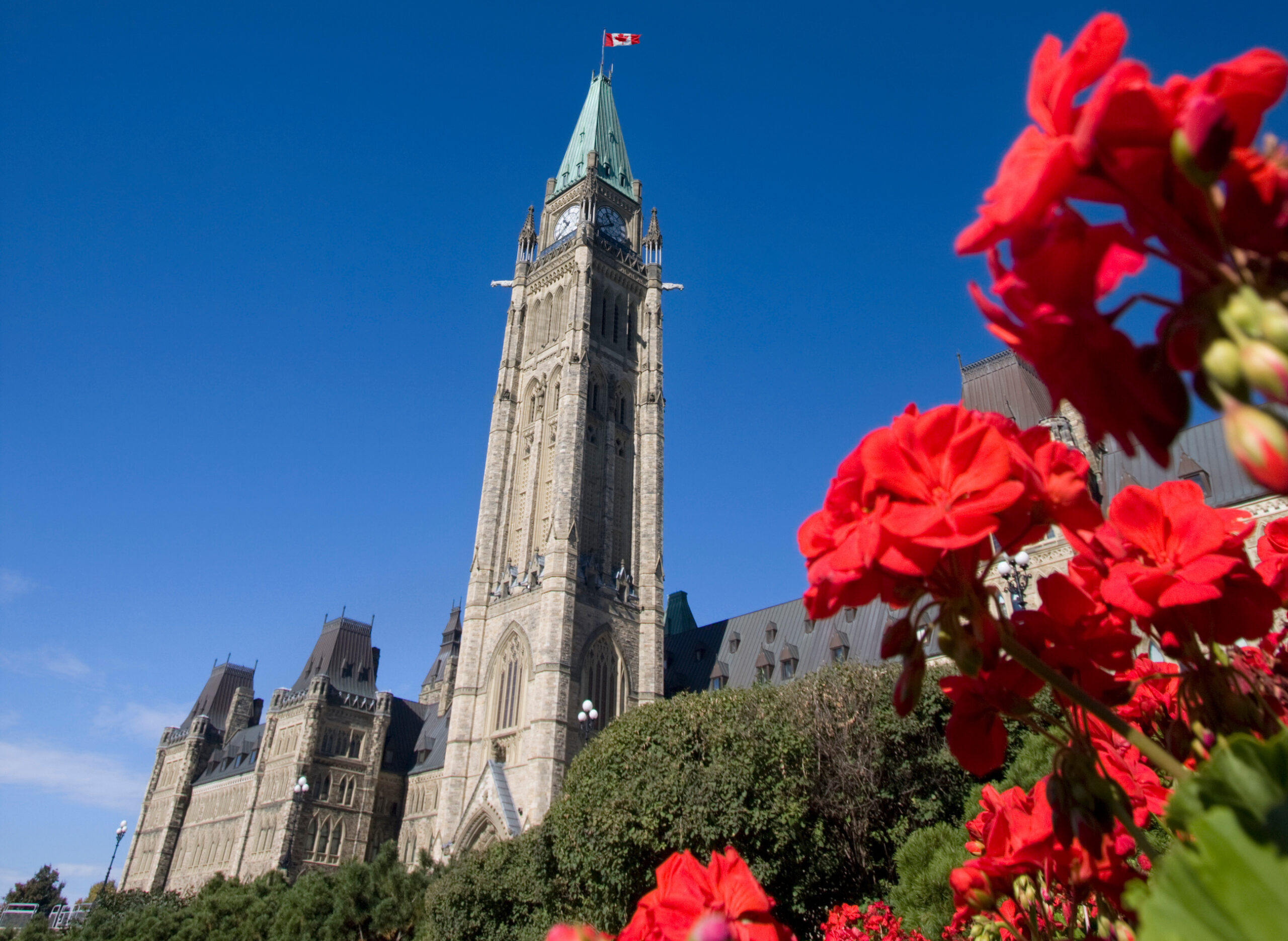The House of Commons rose for the summer break late on Wednesday evening, after completing the legislative agenda for the spring and passing the government’s most recent budget bill at third reading.
The Senate will continue sitting to complete its share of the legislative agenda, including voting on Bill C-59, Fall Economic Statement Implementation Act, 2023, and Bill C-70: Countering Foreign Interference Act, but expect to rise for the summer by Friday. Parliament will resume sitting in the fall on September 16.
The spring sitting was marked by toxic partisanship, and lapses in judgement by Speaker Greg Fergus which questioned his impartiality. These resulted in a motion to dismiss him; while he survived the vote, close to half of all MPs expressed a lack of confidence in him.

The April release of Budget 2024 committed $53 billion in new spending over five years, and proposed increasing the capital gains inclusion rate from one-half to two thirds for trusts and corporations and for individuals on the portion of capital gains that exceeds $250,000.
A June report by the National Security and Intelligence Committee of Parliamentarians (NSICOP) suggested some parliamentarians had allegedly collaborated, deliberately or otherwise, with hostile foreign states.
According to the public polling aggregator 338Canada, most recent public opinion polls show the Conservative Party leading the Liberals by an average of 17 percentage points, 42 per cent to 25 per cent.

The Canadian economy
On June 5, the Bank of Canada (BoC) lowered its key interest rate to 4.75 per cent, marking the bank’s first rate cut since March 2020.
While the economy has effectively been stalled since the middle of 2023 in response to higher borrowing costs, the bank expects GDP growth to reach 1.5 per cent in 2024. In the first quarter of 2024, the economy grew by an annualized rate of 1.7 per cent, though real GDP numbers of higher for the first quarter of the fiscal year.
The BoC forecasts inflation to remain close to 3 per cent during the first half of this year and to move below 2.5 per cent in the second half. According to Statistics Canada’s consumer price index (CPI,) inflation rose by 2.7 per cent in April. As well, job growth remained anaemic in May, with a modest 27,000 new positions created and the unemployment rate up one tenth of a point, to 6.2 per cent.
Budget 2024 projected growth in real gross domestic product (GDP) to slow from 1.1 per cent in 2023 to 0.7 per cent in 2024, before rebounding to 1.9 per cent in 2025.
Political update
Foreign interference
On May 3, public inquiry commissioner, Justice Marie-Josée Hogue, released the first report of the Public Inquiry into Foreign Interference in Federal Electoral Processes and Democratic Institutions, finding there is “ample evidence” of foreign interference from China, India and Pakistan in Canada’s two previous elections and a number of nomination contents leading up to the general elections. The initial report notes the overall outcomes of the elections were likely not changed by the interference, but had potentially impacted the results in several ridings.
Justice Hogue’s final report is due at the end of this year.
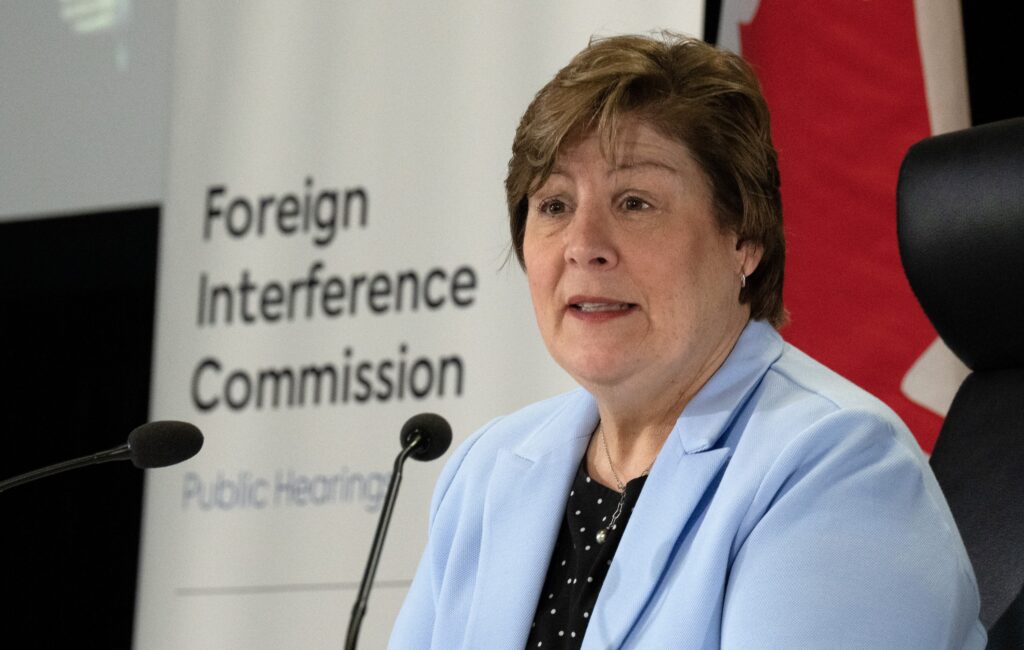
The multipartisan National Security and Intelligence Committee of Parliamentarians (NSICOP) released its own redacted report on foreign interference on June 3. The 96-page report said that the committee has “seen troubling intelligence that some parliamentarians are, in the words of the intelligence services, ‘semi-witting or witting’ participants in the efforts of foreign states to interfere in our politics.”
The report provided details of how parliamentarians participated in these activities but did not identify the individuals involved.
The political parties have so far been unable to agree on the next steps in dealing with the NSICOP report, specifically whether the names of individuals in the report can be released. Opposition Leader Pierre Poilievre has challenged the government to name the politicians involved, but the federal government instead has urged all party leaders to request classified briefings on the NSICOP report to see the unredacted version.
After reading the report, Green Party Leader Elizabeth May played down the findings while NDP Leader Jagmeet Singh said he was alarmed by the report, and that there were “serious examples where parliamentarians engaged in activity that undermined our country.”
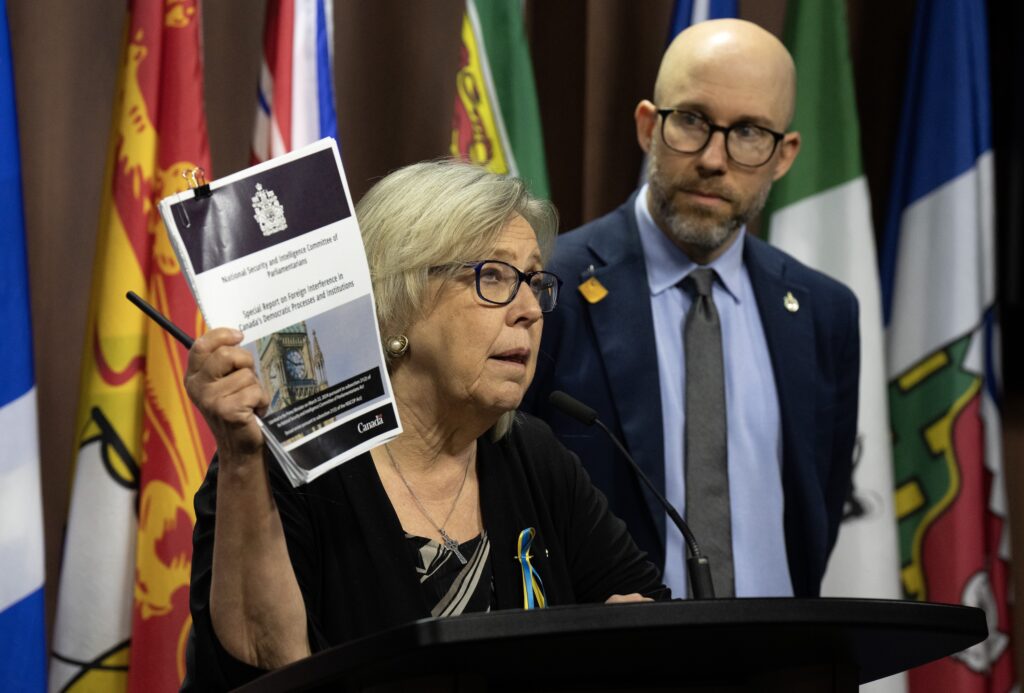
To date, Poilievre has refused a briefing, arguing that it would tie his hands and prevent him from commenting on national security issues, and that the names would still remain secret.
In order to begin to address the concerns raised by the public inquiry, the federal government introduced new legislation to amend the Canadian Security Intelligence Act, the Canada Evidence Act, enact the Foreign Influence Transparency and Accountability Act, among others.
Bill C-70: Countering Foreign Interference Act was introduced by the public safety minister on May 6, and with the support of all parties, was quickly moved through both houses of Parliament before being adopted at third reading in the Senate on Wednesday, June 19. Once implemented, the bill will update rules around the collection and use of voter datasets by political parties, create new offences and broaden the scope of sabotage offences under the criminal code and update provisions on information disclosures by the Canadian Security Intelligence Service (CSIS.) The bill will also require a parliamentary review of the legislation every five years and provide for the appointment of a new Foreign Influence Transparency Commissioner to oversee a new foreign influence transparency registry.
The foreign influence transparency registry would list all individuals that undertake activities on behalf of a foreign government or entity, including political parties, military organizations and other state-owned enterprises.
The changes proposed to the Canadian Security Intelligence Act are significant. They would allow CSIS to share intelligence with partners outside of the federal government for the first time.
Changes to the Criminal Code included in the bill are meant to address attempts at interfering with access to an essential infrastructure, including public and private information, as well as telecommunications infrastructure, government operations, and finances and would be an indictable offence and liable to imprisonment up to 10 years.
The bill would also make engaging in deceptive conduct against a political or governmental process on behalf of a foreign entity an indictable offence, punishable by a maximum sentence of life imprisonment.
The government says these changes will take a year to come into force after receiving Royal Assent.
Capital gains inclusion rate changes
Budget 2024 made two changes to the taxation of capital gains for individual over and above $250,000 a year and for corporations and trusts.
For individuals with gains over $250,000 a year and for all corporations and trusts, the capital gains tax inclusion rate will increase from 50 per cent to 66.67 per cent.
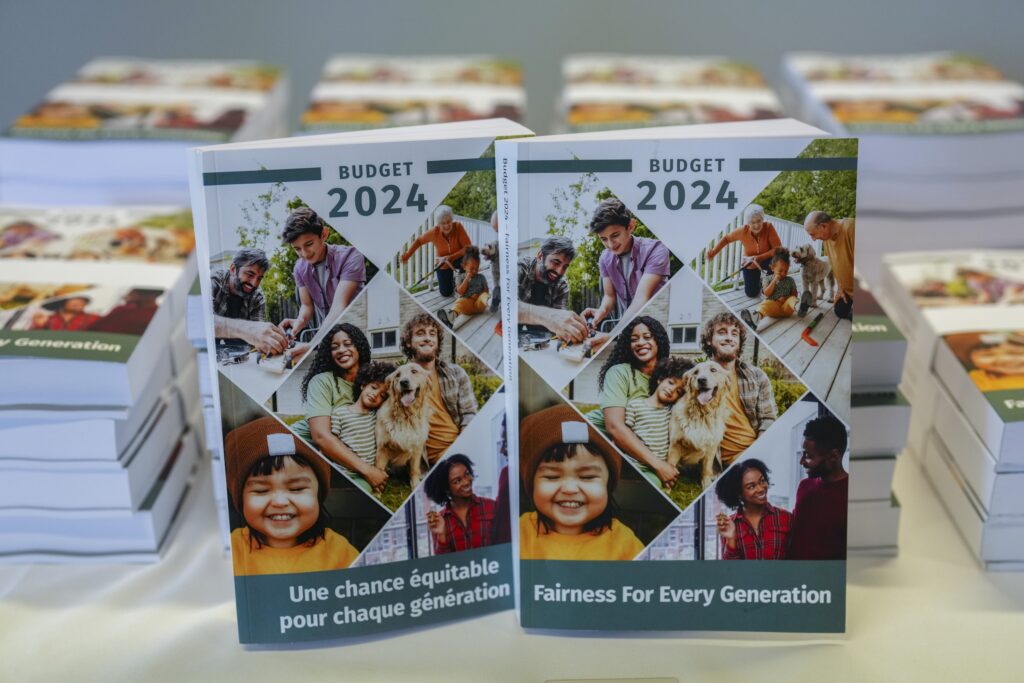
The government has positioned these increases as an issue of tax fairness. In a May 13 social media post, Prime Minister Trudeau said the changes will only affect “less than one per cent of people. At a time when the richest are only getting richer, I think it’s fair to ask those people to pay a little more.”
The changes are forecast to raise $19.4 billion over five years for the federal government, and a further $11.6 billion for the provinces and territories.
In a joint letter, business associations complained, “this measure will limit opportunities for all generations and make Canada a less competitive, and a less innovative nation.”
Other critics called the move “a tax on innovation and risk-taking.”
The Canadian Medical Association said, “changes to the capital gains inclusion rate will add undue pressure on physicians with community-based practices and affect their ability to save for retirement, creating further barriers to retaining and recruiting physicians in Canada at a time when they’re desperately needed.”
Other groups, including Canadians for Tax Fairness and major Canadian labour unions, support the government moving forward with the capital gains inclusion rate changes. These groups have made their own statements in recent weeks, saying that increasing the inclusion rate will make Canada’s tax system more equitable and will help reduce living costs for millions of Canadians.
On June 11, the House of Commons passed the Ways and Means Motion that will introduce legislation on the proposed changes, with 208 MPs voting in favour of and 118 voting against the motion.
The future of open-net salmon farming
On June 19, federal ministers released a draft transition plan which calls for a five-year extension to open-net salmon farming on the west coast. Fisheries Minister Diane Lebouthillier also promised another draft plan by July 31 to help the industry through the changes she is imposing and a final plan in 2025.
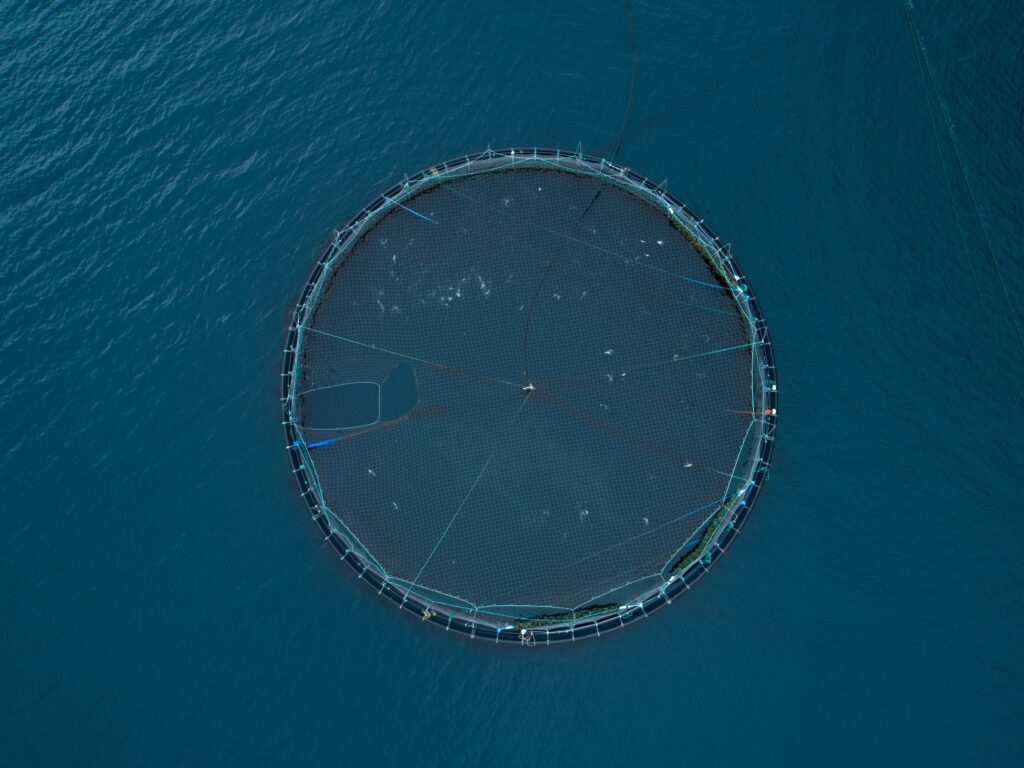
The Liberals had promised in the 2019 election campaign to phase out open-net salmon farms by 2025, but the federal announcement said that industry, First Nations and communities needed more time to make the change.
Trans Mountain pipeline completed
On May 1, the Trans Mountain (TMX) pipeline from Alberta to Vancouver began pumping oil to for the export market.
Originally budgeted at $7.3 billion, TMX ultimately cost $34 billion to build. The federal government bought the pipeline from Kinder Morgan Inc. in 2018 for $4.3 billion.
Huge cost overruns resulted from delays due to Indigenous opposition, COVID-19, inflation, tough regulatory scrutiny, wildfires and floods.
The federal government now faces two challenges:
- As building costs mounted, so did the tolls shippers must pay to use it. The Canada Energy Regulator will hold a hearing in September to resolve the issue.
- The federal government is committed to selling a substantial stake in the pipeline to Indigenous buyers and other investors, but the selling price is expected to be much lower than what it actually cost to build.
Liberal and NDP Supply and Confidence Agreement
Significant progress was made in the sitting in completing the legislative and policy package contained in the Supply and Confidence Agreement (SACA) signed between the Liberals and the NDP in March of 2022.
Bill C-64: Pharmacare Act, Bill C-58, the “anti-scab” legislation, and Bill C-50: Canadian Sustainable Jobs Act were all successfully completed and passed by the House of Commons during the spring sitting. Each bill is expected to be passed by the Senate and receive Royal Assent before the end of the sitting in the Red Chamber.
This coming fall, the two parties will need to consider the future of the SACA, whether it continues, or is renegotiated and updated.
Key byelection in Toronto—St. Paul’s
On Monday, June 24, voters in Toronto-St. Paul’s will choose a new MP to replace former minister and long-time MP Carolyn Bennett, who is now Ambassador to Denmark.
The byelection is seen to be a critical test for Prime Minister Justin Trudeau and his party – a bellwether indicating how the party is faring in an area of the country where Liberals have performed well for decades. Carolyn Bennett held the seat through nine successive elections from 1997 to 2021.
While the prime minister has repeatedly said he will lead the Liberals in the next election, many observers believe this will be a challenge if the Liberals lose Monday’s byelection.
The Liberal candidate is Leslie Church, former chief of staff to Deputy Prime Minister and Minister of Finance Chrystia Freeland. Don Stewart is running for the Conservatives; he has a business background and works for the Canadian Investment Regulatory Organization (CIRO.) The NDP candidate is non-profit director Amrit Parhar and the Green Party is represented by candidate Christian Cullis.
Federal/provincial/territorial relations
Carbon pricing and the aggressive federal stance on housing continue to trouble federal/provincial/territorial (FPT) relationships.
The government of Saskatchewan continues to refuse to collect or remit taxes on natural gas used for home heating to the federal government, after Ottawa announced an exemption on home heating oil from the price on carbon. Earlier in the spring, premiers of all provinces asked for a face-to-face meeting with the prime minister to discuss carbon pricing, but Prime Minister Trudeau has yet to agree to these requests.
Budget 2024 unveiled strict conditions provincial governments must meet to access billions of dollars in spending on housing. Premiers responded with a letter saying that Ottawa should avoid dictating terms in areas the Constitution reserved for provincial governments.
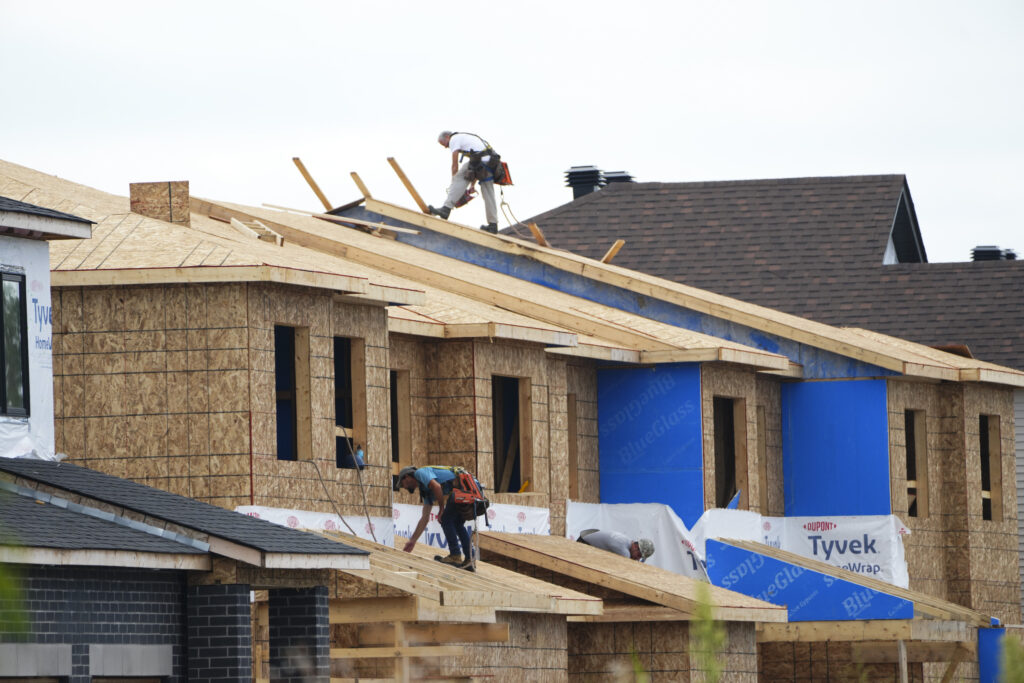
Earlier, Ottawa began signing agreements directly with municipalities through its Housing Accelerator Fund and has also threatened to go around the provinces with its new $6 billion Housing Infrastructure Fund. The infrastructure fund would require provinces to agree to a list of conditions such as increased density to access the money. Ontario rejected those requirements immediately, but subsequently reached a deal with Ottawa to comply with the federal requirements.
In Alberta, after the federal government announced millions of dollars for housing for Alberta municipalities, Premier Danielle Smith introduced two pieces of legislation to counteract what she considers federal interference in provincial jurisdiction:
- Bill 18, Provincial Priorities Act, compels hundreds of provincial entities, including municipalities, to secure provincial approval before entering into agreements with the federal government.
- Bill 20, Municipal Affairs Statutes Amendment Act, proposes granting the provincial cabinet new, unilateral powers to fire councillors or overturn local bylaws, with all such decisions to be made in secret. The bill also includes several elements aimed at accelerating housing development.
In Ontario, Premier Doug Ford took to social media on Thursday, June 20, to issue a statement calling on the federal government to “immediately match or exceed U.S. tariffs on Chinese imports, including at least a 100 per cent tariff on Chinese electric vehicles.” The statement comes weeks after U.S. President Joe Biden announced a similar tariff on electric vehicles (EV) and battery components from China, in order to protect the domestic EV manufacturing market in the United States from being flooded with lower cost EVs and batteries from China.
In May, Industry Minister François-Philippe Champagne said Canada is considering all measures after the announcement by President Biden and wouldn’t rule our imposing similar tariffs in Canada. The government’s current EV sales mandate regulations include a target of 100 per cent zero-emission vehicle, which includes EVs, sales in Canada by 2035. This target is more aggressive than the American target of between 35 and 56 per cent of vehicle sales be EVs between 2030 and 2032. As of writing, the federal government had not yet responded to Premier Ford’s statement.

The B.C. government is considering joining Newfoundland and Labrador’s court case against the federal government over equalization payments. Premier David Eby said the current funding model is broken and it’s leaving provinces like B.C. and Newfoundland behind.
Newfoundland and Labrador launched the court challenge last month, saying Ottawa’s payment scheme puts it at a disadvantage. The federal government had rejected calls to overhaul the funding formula and said there will be no changes before 2029.
“One of the things that shocked me was that British Columbia is sending money to the federal government so they can send it to Ontario,” Premier Eby said. “Ontario received $421 million in equalization funding last year while B.C. got nothing.”
Saskatchewan Premier Scott Moe said his province may join B.C. Newfoundland and Labrador in the court challenge over the equalization formula but had yet to formally sign on as of writing.
Canada’s Premiers will meet for the annual Council of the Federation meetings from July 15-17 in Halifax.
Opioid crisis and “safer supply” of illicit drugs
The issue of drug decriminalization continues to spark tense political debate across the country.
Effective on January 31, 2023, B.C. obtained a three-year exemption from the federal government to decriminalize possession of certain street drugs in all public spaces, including hospitals, restaurants, transit, parks and beaches. The result has been a public backlash against widespread street disorder that has made communities feel unsafe.
On April 28, B.C. Premier David Eby requested the federal government to re-criminalize drug use in public spaces, on May 7, federal addictions minister Ya’ara Saks approved the premier’s request.
Following B.C.’s decision to pull back on decriminalization, and faced with opposition from Ontario Premier Doug Ford, Toronto withdrew its proposal that Ottawa approve a similar request.
A key feature of federal substance abuse policies is “safer supply,” which refers to providing prescribed medications as a safer alternative to the toxic illegal drug supply for people who are at high risk of overdose.
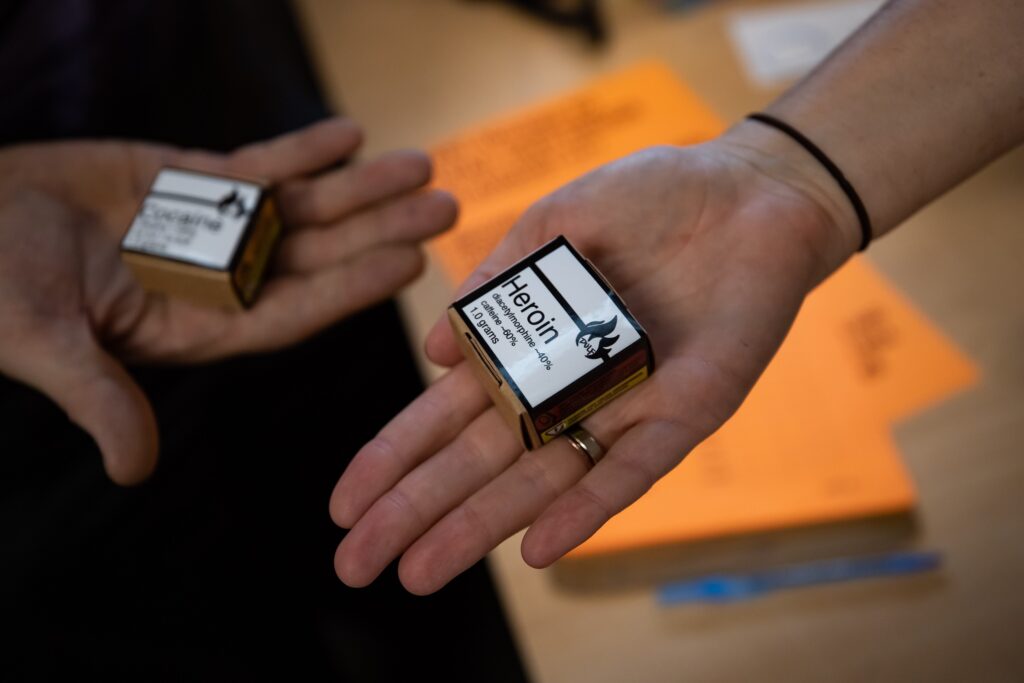
Safer supply has been increasingly under pressure from some addiction treatment experts and police forces who argue that “safe drugs” are turning up on the illicit market after being sold by drug users who have safe supply prescriptions.
Federal Conservative Leader Pierre Poilievre has repeatedly called on the federal government to abandon its harm reduction strategies and focus on recovery-oriented approaches instead.
On May 6, the Conservatives introduced a motion in the House calling on the federal government and provinces to “release all contracts relating to their reckless distribution of hard drugs within three weeks of the adoption of this motion.”
The political scene
According to the 338Canada website, which averages all recent national polls, the Conservatives now have a 17-percentage point lead over the Liberals. As of June 16, the Conservatives were at 42 per cent, the Liberals at 25 per cent, the NDP at 17 per cent, the Bloc Quebecois at 7 per cent, the Greens at 4 per cent and the People’s Party of Canada at 2 per cent.
If the parties’ current standings carry through to the next election, it could produce as many as 206 seats for the Conservatives, who currently have 118; with the Liberals reduced to 80 seats, down from 156; the NDP with 21 seats, down from 25; and the Bloc with 34 seats, up from 32.
The Liberals had hoped that the April 16 Budget would stop their slide in the polls. In advance, the PM and key ministers travelled the country announcing specific housing and affordability measures, designed to appeal to millennials and Gen Z, who have abandoned the Liberals.
Recent post-budget polls suggest that while younger Canadians familiar with the budget were positive to its specific initiatives, these views have not translated into stronger support for the government.

Legislative update
The following bills were passed in the days before the House of Commons rose for the summer:
- Bill C-26: An Act respecting cyber security, amending the Telecommunications Act and making consequential amendments to other Acts completed third reading in the House of Commons on June 19 and is now at second reading in the Senate.
- Bill C-50: Canadian Sustainable Jobs Act was adopted at third reading in the Senate on June 18 and is awaiting Royal Assent.
- Bill C-59: Fall Economic Statement Implementation Act, 2023 was adopted at third reading I the Senate on June 19 and is awaiting Royal Assent.
- Bill C-58: An Act to amend the Canada Labour Code and the Canada Industrial Relations Board Regulations, 2012 was adopted at third reading in the Senate on June 17 and is awaiting Royal Assent.
- Bill C-64: Pharmacare Act was passed at third reading in the House of Commons on June 3 and is now at consideration in the Senate Committee on Social Affairs, Science and Technology (SOCI.)
- Bill C-70: Countering Foreign Interference Act was adopted at third reading in the Senate on June 19 and is awaiting Royal Assent.
The following bills remain before the House of Commons:
- Bill C-27: Digital Charter Implementation Act, 2022 is at consideration in the House of Commons Committee on Industry and Technology (INDU.)
- Bill C-63: An Act to enact the Online Harms Act, to amend the Criminal Code, the Canadian Human Rights Act and An Act respecting the mandatory reporting of Internet child pornography by persons who provide an Internet service and to make consequential and related amendments to other Acts is at second reading in the House of Commons.
- Bill C-33: Strengthening the Port System and Railway Safety in Canada Act completed consideration in the House of Commons Committee on Transport, Infrastructure and Communities (TRAN) on February 7, 2024, and is at report stage in the House.
